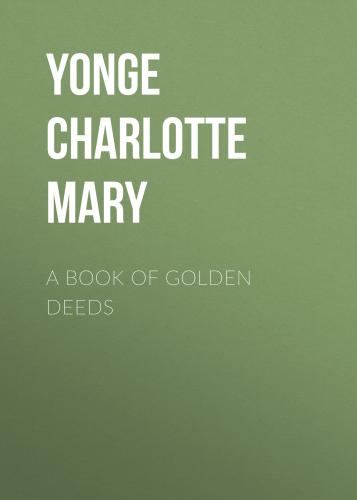And out spake strong Herminius,
Of Titian blood was he,
'I will abide on thy left side,
And keep the bridge with thee.'
So forth went these three brave men, Horatius, the Consul's nephew, Spurius Lartius, and Titus Herminius, to guard the bridge at the farther end, while all the rest of the warriors were breaking down the timbers behind them.
'And Fathers mixed with commons,
Seized hatchet, bar, and crow,
And smote upon the planks above,
And loosen'd them below.
'Meanwhile the Tuscan army,
Right glorious to behold,
Came flashing back the noonday light,
Rank behind rank, like surges bright,
Of a broad sea of gold.
Four hundred trumpets sounded
A peal of warlike glee,
As that great host, with measured tread,
And spears advanced, and ensigns spread,
Roll'd slowly towards the bridge's head,
Where stood the dauntless three.
'The three stood calm and silent,
And look'd upon the foes,
And a great shout of laughter
From all the vanguard rose.'
They laughed to see three men standing to meet the whole army; but it was so narrow a space, that no more than three enemies could attack them at once, and it was not easy to match them. Foe after foe came forth against them, and went down before their swords and spears, till at last—
'Was none that would be foremost
To lead such dire attack;
But those behind cried 'Forward!'
And those before cried 'Back!'
However, the supports of the bridge had been destroyed.
'But meanwhile axe and lever
Have manfully been plied,
And now the bridge hangs tottering
Above the boiling tide.
'Come back, come back, Horatius!'
Loud cried the Fathers all;
'Back, Lartius! Back, Herminius!
Back, ere the ruin fall!'
'Back darted Spurius Lartius,
Herminius darted back;
And as they passed, beneath their feet
They felt the timbers crack;
But when they turn'd their faces,
And on the farther shore
Saw brave Horatius stand alone,
They would have cross'd once more.
'But with a crash like thunder
Fell every loosen'd beam,
And, like a dam, the mighty wreck
Lay right athwart the stream;
And a long shout of triumph
Rose from the walls of Rome,
As to the highest turret-tops
Was splashed the yellow foam.'
The one last champion, behind a rampart of dead enemies, remained till the destruction was complete.
'Alone stood brave Horatius,
But constant still in mind,
Thrice thirty thousand foes before
And the broad flood behind.'
A dart had put out one eye, he was wounded in the thigh, and his work was done. He turned round, and—
'Saw on Palatinus,
The white porch of his home,
And he spake to the noble river
That rolls by the walls of Rome:
'O Tiber! father Tiber!
To whom the Romans pray,
A Roman's life, a Roman's arms
Take thou in charge this day.'
And with this brief prayer he leapt into the foaming stream. Polybius was told that he was there drowned; but Livy gives the version which the ballad follows:—
'But fiercely ran the current,
Swollen high by months of rain,
And fast his blood was flowing,
And he was sore in pain,
And heavy with his armor,
And spent with changing blows,
And oft they thought him sinking,
But still again he rose.
'Never, I ween, did swimmer,
In such an evil case,
Struggle through such a raging flood
Safe to the landing place.
But his limbs were borne up bravely
By the brave heart within,
And our good father Tiber
Bare bravely up his chin.
'And now he feels the bottom,
Now on dry earth he stands,
Now round him throng the Fathers,
To press his gory hands.
And now with shouts and clapping,
And noise of weeping loud,
He enters through the River Gate,
Borne by the joyous crowd.
'They gave him of the corn land,
That was of public right,
As much as two strong oxen
Could plough from morn to night.
And they made a molten image,
And set it up on high,
And there it stands unto this day,
